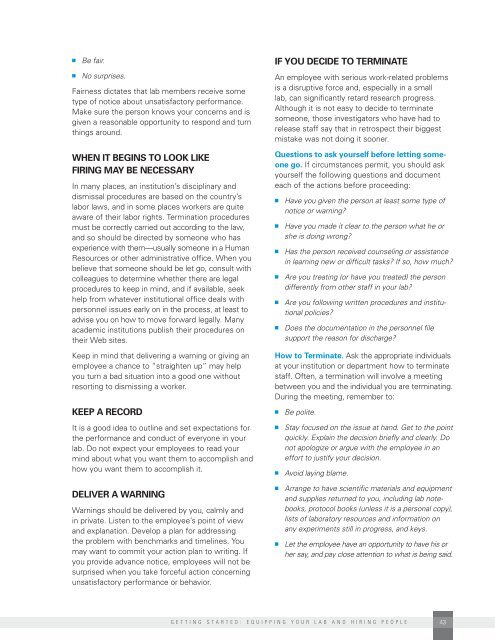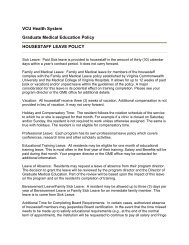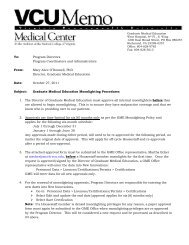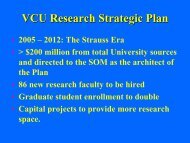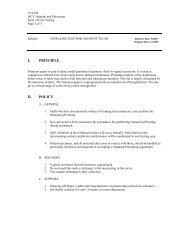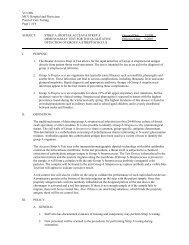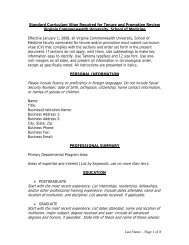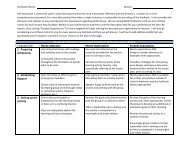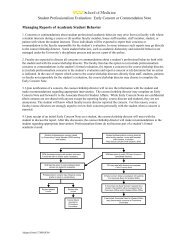Multinational Organizations are hiring ourpeople away!Brain drain continues to be a major problemin the developing world, where NGOs and theprivate sector pay better salaries than governmentresearch institutes. Dealing with braindrain can be quite frustrating; however, oneshould continue to recruit appropriate personnelto fill in vacancies. Those recruited shouldbe given an opportunity to train in short- andlong-term courses that are relevant to theirwork areas. Once settled in the researchprogramme, they should also be encouragedto be a part <strong>of</strong> the ownership <strong>of</strong> the researchprogramme, and to make presentations onsome <strong>of</strong> the research aspects <strong>of</strong> the workthat is being done. Presentation <strong>of</strong> researchfindings at national and international fora isusually a big motivator, because it promotescollaborative linkages between personnel inyour lab and other labs, and these linkagesmay generate a lot <strong>of</strong> research ideas betweengroups. Delegation with responsibility to juniorresearchers also builds confidence and givesthem a sense <strong>of</strong> ownership <strong>of</strong> the researchprogramme. In countries where salariesare low, personnel should be allowed to dopart-time jobs that are related to research,e.g. teaching at the local university to supplementtheir salaries. All research ideas thatare brought forward by research personnel,especially junior members, should be takeninto consideration and explored for substance,no matter how silly they may sound.”Susan Mutambu, ZimbabweYes, it is a problem, but not a major one fornow. The solution is creating an attractiveenvironment, clear career paths, stable socialenvironment, etc. High salary is not always themost important incentive in keeping staff.”Abdoulaye Djimdé, MaliOnce you have filled the position, try to let theother applicants know <strong>of</strong> the outcome <strong>of</strong> the interview.You do not need to give a specific reason foryour decision not to hire an applicant. However,you may state that the selected candidate hadbetter qualifications or more relevant experienceor that it is your policy not to disclose this information.Check with the appropriate people at yourinstitution about their own personal policy or theinstitution’s personnel policy in this area.The Offer LetterAfter you and the selected candidate have confirmedthe job details, you or your institution mightsend a formal <strong>of</strong>fer letter that confirms the <strong>of</strong>ferterms, including start date and salary. Coordinatewith the appropriate administrative staff at yourinstitution to determine what information to include.If hiring does not involve an administrative <strong>of</strong>fice,make the <strong>of</strong>fer and clearly establish the start date,salary, and allowances and pensions where theseare applicable. It is a good idea to put the detailson paper in case disagreements arise later.ASKING STAFF TO LEAVEDespite your best efforts, you may at some pointneed to ask someone to leave your lab. Beforeconsidering dismissal, be sure that you have triedvarious avenues to help the person be successful inyour lab. This may include assistance with scientifictechniques or counseling for behavioral issues. Also,be certain that your dissatisfaction is based onobjective observations, not your personal biases.Try to determine whether you think the personwould be better <strong>of</strong>f in another lab or should consideranother career. For students and scientists,this usually means talking with that person and hisor her advisors, if any. It may be best to suggestto someone that research is not for them if youtruly believe the pr<strong>of</strong>ession is not suited to his orher talents or personality. You can provide thatperson with encouragement and suggest othercareer options, especially ones <strong>of</strong> similar stature.There are no hard and fast rules about how amanager should address performance or behaviorproblems in the lab. However, keep in mind thefollowing, especially if you are thinking about lettingsomeone go:42 excellence everywhere
n Be fair.n No surprises.Fairness dictates that lab members receive sometype <strong>of</strong> notice about unsatisfactory performance.Make sure the person knows your concerns and isgiven a reasonable opportunity to respond and turnthings around.When it Begins to Look likeFiring May Be NecessaryIn many places, an institution’s disciplinary anddismissal procedures are based on the country’slabor laws, and in some places workers are quiteaware <strong>of</strong> their labor rights. Termination proceduresmust be correctly carried out according to the law,and so should be directed by someone who hasexperience with them—usually someone in a HumanResources or other administrative <strong>of</strong>fice. When youbelieve that someone should be let go, consult withcolleagues to determine whether there are legalprocedures to keep in mind, and if available, seekhelp from whatever institutional <strong>of</strong>fice deals withpersonnel issues early on in the process, at least toadvise you on how to move forward legally. Manyacademic institutions publish their procedures ontheir Web sites.Keep in mind that delivering a warning or giving anemployee a chance to “straighten up” may helpyou turn a bad situation into a good one withoutresorting to dismissing a worker.Keep a RecordIt is a good idea to outline and set expectations forthe performance and conduct <strong>of</strong> everyone in yourlab. Do not expect your employees to read yourmind about what you want them to accomplish andhow you want them to accomplish it.Deliver a WarningWarnings should be delivered by you, calmly andin private. Listen to the employee’s point <strong>of</strong> viewand explanation. Develop a plan for addressingthe problem with benchmarks and timelines. Youmay want to commit your action plan to writing. Ifyou provide advance notice, employees will not besurprised when you take forceful action concerningunsatisfactory performance or behavior.If You Decide to TerminateAn employee with serious work-related problemsis a disruptive force and, especially in a smalllab, can significantly retard research progress.Although it is not easy to decide to terminatesomeone, those investigators who have had torelease staff say that in retrospect their biggestmistake was not doing it sooner.Questions to ask yourself before letting someonego. If circumstances permit, you should askyourself the following questions and documenteach <strong>of</strong> the actions before proceeding:n Have you given the person at least some type <strong>of</strong>notice or warning?n Have you made it clear to the person what he orshe is doing wrong?n Has the person received counseling or assistancein learning new or difficult tasks? If so, how much?n Are you treating (or have you treated) the persondifferently from other staff in your lab?n Are you following written procedures and institutionalpolicies?n Does the documentation in the personnel filesupport the reason for discharge?How to Terminate. Ask the appropriate individualsat your institution or department how to terminatestaff. Often, a termination will involve a meetingbetween you and the individual you are terminating.During the meeting, remember to:n Be polite.n Stay focused on the issue at hand. Get to the pointquickly. Explain the decision briefly and clearly. Donot apologize or argue with the employee in aneffort to justify your decision.n Avoid laying blame.n Arrange to have scientific materials and equipmentand supplies returned to you, including lab notebooks,protocol books (unless it is a personal copy),lists <strong>of</strong> laboratory resources and information onany experiments still in progress, and keys.n Let the employee have an opportunity to have his orher say, and pay close attention to what is being said.GETTING STARTED: Equipping Your Lab and Hiring People43
- Page 3 and 4: A R e s o u r c e f o r S c i e n t
- Page 5 and 6: Table of ContentsVII119PrefaceChapt
- Page 7: 135 Chapter 10E x p a n d i n g Y o
- Page 15 and 16: Q u e s t i o nq&aWhat Is a “Tenu
- Page 17: preparing for immediate submission,
- Page 22 and 23: Practicing the Talkn Practice your
- Page 24 and 25: your one-on-one interviews you have
- Page 26 and 27: If talking directly about money is
- Page 28 and 29: When the institution responds and y
- Page 30 and 31: equipment and supplies. Maintenance
- Page 32 and 33: Q u e s t i o nq&aIs your instituti
- Page 34 and 35: Working With Human SubjectsWhether
- Page 36 and 37: RESPONSIBILITIES BEYONDTHE LABORATO
- Page 38 and 39: UNDERSTANDING YOURINSTITUTION AND H
- Page 40: Criteria for PromotionStructure of
- Page 45 and 46: Q u e s t i o nWhat’s in a Name?q
- Page 47 and 48: Screening ApplicantsWhen you review
- Page 50 and 51: Interpersonal Skillsn How important
- Page 54 and 55: n If there is an office that handle
- Page 57 and 58: n Seek funding and publish papers (
- Page 59 and 60: In fact, even though you yourself h
- Page 61 and 62: n Craft a statement that you feel c
- Page 63 and 64: n When you delegate authority to so
- Page 65 and 66: n Use only pens, preferably with wa
- Page 67 and 68: Strategy sessionsShould you decide
- Page 69 and 70: Finding Good Papers for Journal Clu
- Page 71 and 72: If possible, invite people in your
- Page 73 and 74: Q u e s t i o nq&aHow do I avoid po
- Page 75 and 76: The International Committee of Medi
- Page 77 and 78: Managing Conflictin the LabConflict
- Page 79 and 80: steps for dealing with conflictWhen
- Page 81 and 82: chapter 5managing your time“ Succ
- Page 83 and 84: Check your work: the 90-year though
- Page 85 and 86: n Make and keep appointments with y
- Page 87 and 88: n Help them seek advice without tak
- Page 89 and 90: FAMILY MATTERSMany scientists face
- Page 91 and 92: chapter 6project management“ We m
- Page 93 and 94: My project is to get a grant funded
- Page 95: ObjectivesObjectives are the end re
- Page 98 and 99: The key events schedule and the act
- Page 100 and 101: Microsoft Project, a program that s
- Page 102 and 103:
Martin, Vivien. Managing Projects i
- Page 104 and 105:
appendix II: Example of a Work Brea
- Page 106 and 107:
appendix iv: Example of a Gantt Cha
- Page 108 and 109:
e h i n d c l o s e d d o o r s :w
- Page 110 and 111:
Who might be interested in supporti
- Page 112 and 113:
Call your program officerProgram of
- Page 114 and 115:
direct costs vs. indirect costsDire
- Page 116 and 117:
RESOURCESAllen, Ernest M. “Why ar
- Page 118 and 119:
the next generation of students (th
- Page 120 and 121:
Seek Feedback through a Formal Peer
- Page 122 and 123:
Encouraging Student Questionsn Do n
- Page 124 and 125:
Here are some ways you can help the
- Page 126 and 127:
n Are there curriculum changes unde
- Page 128 and 129:
a relaxed format for talking about
- Page 130 and 131:
spend in preparing an effective cou
- Page 132 and 133:
The Publishing ProcessTypes of Jour
- Page 134 and 135:
A word about impact factorsThe impa
- Page 136 and 137:
C r e a t i n g a n i n t e g r a t
- Page 138 and 139:
may need to take the first author p
- Page 140 and 141:
submitting image filesToday, most i
- Page 142 and 143:
Submitting your Paper to Another Jo
- Page 144 and 145:
RESOURCESDavis, Martha. Scientific
- Page 146 and 147:
increase your impact as a scientist
- Page 148 and 149:
Q u e s t i o nq&aHow do I communic
- Page 150 and 151:
n Offer criticism and correction in
- Page 152 and 153:
It is important to discuss career g
- Page 154 and 155:
When Mentoring,Advisory, or Supervi
- Page 156 and 157:
For researchers in developing count
- Page 158 and 159:
n Is travel safe and convenient, or
- Page 160 and 161:
n The expected contribution of each
- Page 162 and 163:
Meetings. Set up systems to ensure
- Page 164 and 165:
SPECIAL CHALLENGESFOR THE BEGINNING
- Page 166 and 167:
e an important connection to future
- Page 168 and 169:
The invention of a new method or pr
- Page 170 and 171:
licensee, who can charge others for
- Page 172 and 173:
Most profound for developing countr
- Page 174 and 175:
Finally, the patents have been chal
- Page 176 and 177:
And, India benefited as a supplier
- Page 178 and 179:
paperwork involved in purchasing1.
- Page 180 and 181:
labeling mattersA case in point: In
- Page 182 and 183:
equipment, freeze-drying equipment,
- Page 184 and 185:
Responsibilityfor materialsIf an or
- Page 186 and 187:
Recent Improvementsin Materials Tra
- Page 188 and 189:
“Knowledge is power.” —Sir Fr
- Page 190 and 191:
MOUMemorandum of UnderstandingRFPRe
- Page 192 and 193:
notes continued182 excellence every
- Page 194:
notes continued184 excellence every


